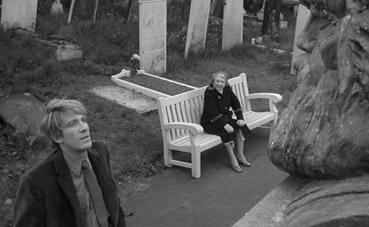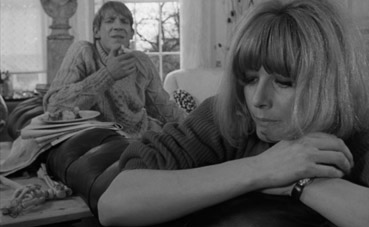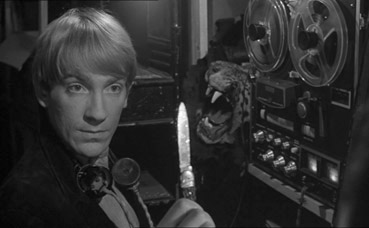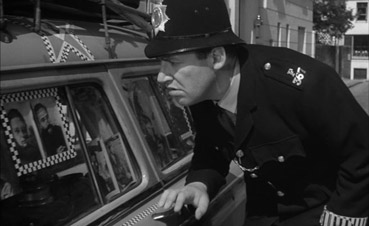| |
"Your dad was onto you the day he drowned those kittens. You knew what would happen to them if he gave them away. But no, oh no, drowning was cruel you said. Your dad said to me that day after. He says, you know what you've done, don't you. Given birth to a bleedin' liberal." |
| |
Mrs. Delt lectures her son Morgan on class betrayal |
| |
"Where has love got me? Where has gentleness got me? You know violence has a kind of dignity in a loving man. And I'm full of love." |
| |
Morgan obliquely threatens love rival Charles Napier |
It's become tiresomely fashionable of late to be loudly dismissive of the 60s. This rarely comes from those who lived through the decade, but that new breed of comics and TV presenters who have traded in humour for a sneering but directionless cynicism and a self-satisfied pursuit of fame and/or notoriety. The 60s were bollocks, they assure us. They weren't even born then but they read about it somewhere and it sounds rubbish to them. Well arseholes to that. I was way too young then to appreciate the decade and what it had to offer, but it's a period of western history that always sounded pretty damned good to me, particularly when compared to the altar of unprincipled greed at which so many now seem happy to pray. Frankly, we could do with a little of the rebellious spirit that makes that particular period seem so retrospectively attractive. Last year's student protests filled my heart with a nostalgic glow, and net-based action like Operation Payback and the Twitter-organised demonstrations against corporate tax avoidance saw a new breed of technologically skilled revolutionary flexing their muscles in a battle with the giants of international corporate capitalism. Ah, it brings a tear to my eye.

Artistically, the 60s were also an exciting time, with a new freedom in art, literature and cinema reflected in a willingness on the part of film studios and television to take chances and encourage new talent and experimentation. Widespread opposition to the war in Vietnam and the establishment in general also provided socially conscious writers and filmmakers with an appreciative audience, which made their projects potentially attractive for those willing to put up the production dosh. In this pre-digital age, even small scale features were expensive to make, which for left-wing filmmakers sometimes meant sleeping with the enemy, one whose lack of scruples meant they'd throw funds at anything that might turn a profit, whatever its political persuasion. But then there's something rather gratifying about a system that willingly forks out for a work that criticises and encourages rebellion against it, hence Lindsay Anderson's proclamation that the duty of the artist is to bite the hand that feeds it, a guideline I still treasure and encourage everyone to live by.
It's this creative rebellion that makes Morgan Delt – the title character of Morgan: A Suitable Case for Treatment, a splendid but too rarely screened blend of drama, comedy, pathos and social commentary – both a product of his time and so retrospectively refreshing. A self-confessed dreamer with a gorilla obsession, he is damaged contradiction, a working class artist with revolutionary tendencies who kicks against established thinking, but who has married into money and refuses to accept that his wife Leonie is divorcing him to marry bourgeois gallery owner Charles Napier.
It's initially difficult to be sure whether Morgan's refusal to give up on Leonie is born of love or that infuriation male sense of ownership, which extends to his refusal to vacate a house that, although owned by Leonie, he still regards as his home. This battle for control continues when he moves into Leonie's car, foiling her attempt to have it repossessed and setting up home only yards from her doorstep. But the emotional root of his attachment is eventually revealed when he kidnaps Leonie and transports her to an isolated Welsh lakeside, where the trappings of suburbia are traded in for a tent, and the shivering and frightened Morgan tells her in all sincerity, "Nothing in this world seems to live up to my best fantasies, except you."

For a good part of its running time, the film revels in Morgan's anarchic determination to win back his wife by whatever means possible, wiring the house up with speakers to sabotage Charles and Leone's love life, placing a small bomb under the marital bed that is inadvertently set off by Leonie's prim mother, and confronting Charles at his gallery with gun, knife and knuckle duster, a move his would-be victim dismisses by refusing to take the threat seriously. It's Morgan's resulting sense of emasculation that may well be at heart of his fascination with gorillas, whose chest-beating, arm-dangling and facial expressions he imitates in a simian demonstration of male ground-standing, one dismissed by others as further evidence of his mental instability. Increasingly, he views human behaviour in animalistic terms, his observations intercut with associative wildlife film clips and extracts from King Kong and an unidentified Tarzan movie.
What keeps Morgan from giving up on Leonie, and us from writing him off as hopelessly deluded, is Leonie's self-doubt at the decision she has made. Living with Morgan has clearly driven her to distraction, but the stability Charles represents comes at a price, lacking as it does the passion, spontaneity and sheer fun that presumably drew her to Morgan in the first place. It's to the credit of all concerned that this uncertainty is never overplayed, but fleeting glimpsed in an unappreciated moment of wildness in Charles's convertible, her excitement at the prospect of the two men fighting for her virtue, and the brief crumbling of her stoicism to comfort Morgan when his bluster fails. There's thus an element of truth to Morgan's warning to Charles: "You don't know Leonie! She married me to achieve insecurity and you're trying to take it away from her. She won't thank you for that!"
The foundation of Morgan lies in its consistently excellent and BAFTA Award-winning screenplay, the work of acclaimed playwright and television dramatist David Mercer, who later penned the extraordinary broken-mirror script for Alain Resnais' 1977 Providence.* The central concept of a rejected husband trying to win back his wife from his well-to-do replacement is the stuff of a thousand romantic comedy-dramas, but so richly drawn are the characters here, so inventive the dialogue and so offbeat the detail that you'd swear this was the first time the concept had been committed to film. It's one of those happy turns of fate that the script fell into the hands of Karel Reisz, one of the leading lights of 50s Free Cinema and the British New Wave. He borrows a few tricks from Dick Lester's pioneering work on A Hard Day's Night and shows a real knack for unforced visual comedy (Morgan's stony-faced knife-pull on Charles, and his motorbike ride in a smoking gorilla costume are laugh-out-loud moments), but grounds even the wilder elements in Morgan's own melancholic sense of loss and defeat. This is as much social as personal, and a sobering reflection of changing times, a free-spirited revolutionary who is crushed by the forces of conventionality and capitalism – even Leonie gives in to the middle-class dream and has her once cherished home converted into profit-making flats. Completing the talent-of-the-time round-up is an engaging score by jazz composer John Dankworth, and assisting the director is young filmmaker-to-be Stephen Frears, he of My Beautiful Laundrette, Prick Up Your Ears, Dangerous Liaisons and High Fidelity.

The casting is inspired, particularly considering the two leads were effectively newcomers. David Warner is wonderful as Morgan, bringing an energy, humanity and humour to a character who in real life would likely prove exhausting (if intermittently exhilarating) company. It's a performance that by rights should have launched him to stardom, but like equally talented fellow 60s newcomer Tom Bell, he was subsequently consigned largely to supporting roles, at which, it must be said, he has done rather well. Equally impressive is fellow leading role debutante Vanessa Redgrave, whose finely judged balance of weariness, vulnerability and lingering affection landed her Oscar, Golden Globe and BAFTA nominations, and a Best Actress prize at the 1966 Cannes festival (the film itself was also nominated for the Palme D'Or).
The supporting cast is peppered with delights, including Robert Stephens as the annoyingly cocksure Charles, and Arthur Mullard as Morgan's gruff but good-hearted wrestler friend Wally. Also noteworthy is Carry-On regular Bernard Bresslaw as a hopscotch-playing policeman whom Morgan educates on the persecution and assassination of Leon Trotsky, a sequence that subtly lays the ground for a climactic revolutionary daydream whose imagery momentarily prefigures the climax of If...., which was directed Reisz's fellow Free Cinema co-founder Lindsay Anderson. But almost stealing the film from under nose of the lead players is the glorious Irene Handle as Morgan's long suffering mother, an old-school socialist whose love for her son doesn't prevent her from berating him for sitting on his artistic talent and shacking up with a member of the bourgeoisie. She also gets some of Mercer's most memorable lines and delivers them with deadpan comic precision. When she and Morgan visit Karl Marx's grave on the anniversary of her husband's death, it's she that perfectly captures the film's rebellious undertow: "Your dad used to love coming here," she reflects dreamily to Morgan, "You know he wanted to shoot the royal family, abolish marriage, and put everybody who'd been to public school in a chain gang. He was an idealist, your father."
Contrary to the pre-publicity, this is not the first appearance of Morgan on UK DVD, having previously been released by Momentum in association with Studio Canal. That was not one of the great transfers of the DVD age, boasting a fuzzy, slightly wobbly and cropped 4:3 picture that was peppered with dust spots and small scratches. Given that this new Optimum release is also in association with Studio Canal, I was twitching a little even as I requested a review disc, so it's with some relief that I can report that that earlier transfer has been noticeably improved on here – the anamorphic 1.66:1 picture is sharper and noticeably cleaner, though there is still some very minor picture instability in places. We're still a little short of Criterion crispness, but the contrast is well balanced (if sometimes lacking in punch) and given the film's vintage the overall result is rather good.

The mono 2.0 soundtrack is clear and unblemished by damage and background hiss, allowing for the expected restrictions in dynamic range and slight treble bias.
Not a thing. A big shame.
A fondly remembered 60s delight, Morgan: A Suitable Case for Treatment still holds its own thanks to a terrific script, imaginative handling and a consistently superb cast. The picture improvement on this DVD is a great relief, but the lack of extra features is once again disappointing. I'm too fond of the film to complain too loudly, and for the main feature alone it comes recommended, but I'd definitely shop around before buying.
* A film in which David Warner also appeared, playing a character who gradually mutates into a werewolf.
|